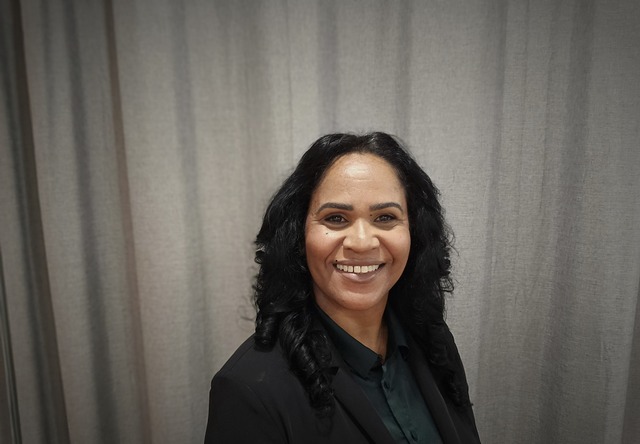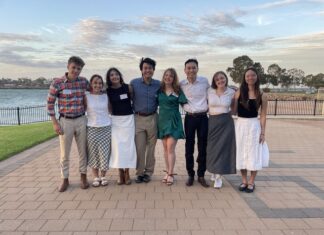As the national crisis of family violence continues, services and support are increasing in demand.
In South Australia, Family Violence Legal Service Aboriginal Corporation (FVLSAC) is a specialised organisation providing free legal and non-legal support to Aboriginal and Torres Strait Islander people, families and communities affected by domestic, family and sexual violence in South Australia.
This vital organisation has grown in services offered and include community legal education, community development activities as well as policy and law reform.
Established in 2011 through the amalgamation of Family Violence Prevention Legal Services from Port Augusta, Ceduna, and Port Lincoln, the organisation aims to create safe spaces for Aboriginal people to access support that is trauma-informed, culturally appropriate, and focused on community healing.
Deputy chief executive officer Tosha Sambo is the organisation’s representative with the First Nations Advocates Against Family Violence National Forum and the South Australian Aboriginal Community Controlled Organisation Network, which includes membership of the new Aboriginal Partnership Committee with the Royal Commission into Domestic, Family and Sexual Violence in South Australia.
Through her work within the domestic, family and sexual violence sector, she works alongside a multidisciplinary team within the context of a Family Violence Prevention Legal Service, to ensure culturally appropriate and holistic services are delivered to Aboriginal and Torres Strait Islander peoples and communities in the regional and remote areas of South Australia.
“The FVLSAC serves as the only organisation in South Australia specifically designed to deliver family violence prevention legal services to Aboriginal communities, an essential role given the unique challenges Aboriginal people face, especially in regional areas,” Ms Sambo said.
“Through client-centered support, FVLSAC offers tailored assistance helping to bridge the gaps in mainstream services, addressing community-specific needs with sensitivity to cultural, social, and economic barriers.”
By supporting families through legal assistance, early intervention, community education and collaborative partnerships, FVLSAC plays a pivotal role in fostering resilience and facilitating systemic change.
The organisation contributes to steps with solutions by educating women on critical issues such as recognising coercive control, safety planning, and understanding their legal rights.
Its programs such as Sista 2 Sista and Love Colours, provides information sessions in a culturally appropriate environment where women can learn, share experiences and connect with local support networks.
“These initiatives are specifically designed for regional communities,” Ms Sambo said.
“Giving Aboriginal women practical tools for personal safety and empowerment.”
Women benefit from these resources as they gain knowledge about legal rights and support systems, cultivating a sense of control and security.
Ms Sambo is passionate about supporting Aboriginal self-determination and she sees the best in people, in addition to encouraging others to embrace the rich culture of Aboriginal and Torres Strait Islanders.
Her positive attitude by nature motivates others to chase opportunities for growth, inspiration to overcome challenges in life and to advocate and amplify the voices of the most vulnerable people, that she represents.
Women in regional Australia often have a different set of family violence circumstances. The organisation understands isolation and limited access to services for women including those from culturally and racially marginalised groups are common challenges in regional areas.
Women are encouraged to reach out to local support networks, including trusted community leaders, health services and organisations like FVLSAC.
FVLSAC offers culturally sensitive, trauma-informed case management and wrap-around support services, which is beneficial for women navigating complex personal and legal matters and ensuring their confidentiality and privacy allows women to seek our help without fear.
The FVLSAC’s website provides accessible information on legal and client support services, community legal education, family violence prevention, and safety planning tailored for Aboriginal communities.
Through online resources, women can explore their options and learn about available services. FVLSAC also maintains a confidential 1800 helpline, which allows women in remote areas to connect with our three offices at no cost.
The organisation aims to make digital resources increasingly robust, ensuring that women across South Australia, including remote regions, have access to the information and help they need.
“The service is one of fifteen Family Violence Prevention Legal Services across Australia that operate in rural, remote, and very remote locations in every State and Territory, and are uniquely placed to support women and children impacted by domestic, family and sexual violence,” Ms Sambo said.
FVLSAC, is committed to empowering women by offering not only legal assistance however also holistic support, which includes emotional and community well-being. For women in regional areas, accessing support can sometimes feel out of reach, FVLSAC aims to change that.
The voices of women with lived experience and or people supporting someone who is experiencing domestic, family and or sexual violence will have an opportunity to be listened to.
FVLSAC encourages women to participate in the “Share With Us” survey currently taking place with The Royal Commission into Domestic, Family and Sexual Violence in South Australia and further information is available on its website.








